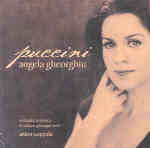There is something irresistible about Angela Gheorghiu’s voice. You might think its dusky, grainy bottom and middle and the purity and gleam of the top notes would be a jarring combination, but it isn’t. Somehow, the art with which she uses her voice, and its sheer beauty and uniqueness, makes it impossible not to listen to her when the CD is playing. Even if your attention is elsewhere, she never recedes into the background.
That having been said, all of the arias here, though beautifully sung, phrased, and inflected, are not quite “hers”. Listen to both of Mimi’s arias and admire the pensive, girlish quality–but somehow, the way Tebaldi’s voice blooms on the high As comes to mind, and when Tebaldi recedes, Freni’s innocence is recalled. The Butterfly arias are splendid, but they made me want to listen to Renata Scotto’s versions of them. “Sola, perduta, abbandonata” is just right for Gheorghiu’s darkish delivery, and it’s very effective; Callas’ desperation, however, is all too easily remembered. Gheorghiu’s “Sogno di Doretta” couldn’t be more elegantly or wonderfully delivered, but Leontyne Price’s ravishing portamentos up to the high notes lingers. Gheorghiu bravely sings Minnie’s “Laggiu nel Soledad” from Fanciulla, and ends it with an interpolated, unnecessary high note–but there’s no context for the aria and it just doesn’t work (there are reasons why it’s never excerpted). This and Turandot’s “In questa reggia” are, at any rate, a size or three too large for Gheorghiu at this point.
Because I am a fan of Gheorghiu’s and always admire her work, I must lay much of the failure of this recital at the feet of conductor Anton Coppola. I doubt I’ll ever again hear these arias performed so slowly. He turns “O mio babbino caro”, a song sung by a 15-year-old girl, into a dirge. Musetta’s Waltz is in danger of coming to a complete halt, and the orchestra has no sparkle whatsoever–Coppola leads it at the same tempo as “Senza Mamma”, and that can’t be right. And if he’s responsible for the interpolated high notes and the tacky “concert ending” to “In questa reggia”, he should be ashamed.
The included bonus CD contains Gheorghiu’s fine reading of Tosca’s “Vissi d’arte” from her complete recording under Antonio Pappano, which serves to underpin Anton Coppola’s lifeless leadership of the 17 arias on the “main” CD. Husband Roberto Alagna is heard hollering Butterfly’s name at the end of her death scene (albeit from too close a perspective), and as Calaf–and he’s in stunning voice. An artist as thoughtful as Gheorghiu needs a conductor who will work with her–unless, of course, the moribund tempos were her idea (she’s known to be headstrong), in which case, I’m stumped.
































